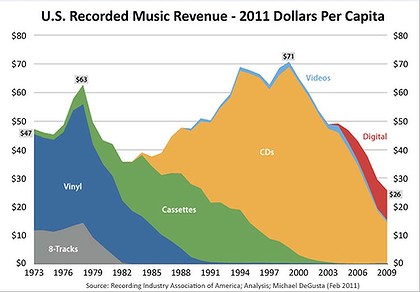After the mortgage crisis, Enron, and Bernie Maddoff, people are angry at the fraudsters, and (maybe) rightfully so. But did the fraudsters by perpetrating the fraud actually contribute to the growth of the economy, more so than if they hadn't? It may seem ridiculous at first to give fraudsters credit for growing the economy because on the balance sheet we can see how much destruction they've caused. However, during the period of the fraud, people had hope and were putting their energy behind building real assets. This is energy that would have gone untapped if they were not put in a situation of high hope.
Before we dismiss fraud completely as a growth engine, let's take a look at other phenomena in our economy.
1. Music pirating: Pirating cost the music industry billions of dollars every year, or so it seems on the balance sheet. But when analysts look at the numbers closely, music sales had increased dramatically since the introduction of music piracy. So even though there are a lot of people who are getting music illegally for free, there are a lot more who are buying music due to the exposure created by piracy.
2. WWII: If we're concerned about assets being destroyed in frauds, then let's not skip talking about war. Wars on the scale of WWII is really just an engine to destroy assets. You build things that you know will get destroyed. However, WWII stimulated the economy enough to bring Americans out of the Great Depression. We weren't building shit for Americans to enjoy, we were building shit to get destroyed. War is probably the largest fraud that the government pull on the people, but it stimulated the economy.
A fraud like Bernie Maddoff's, if not discovered, could be perpetrated forever. In that case everyone would be happy. Even a legitimate business like a bank would not be able to give money to all their clients who demanded it if they demanded it at the same time. I will continue to give my inputs as I think of them, but for now what do you think about fraud as being an economic growth engine?
Is Fraud Good For the Economy?
Is Fraud Good For the Economy?
Sigmund Freud defined four parts of a psyche; the id, the ego, the superego and the stratego. The Stratego being the highest form of morality and scientific thinking.
If guns are not outlawed, the in-laws will have guns.
If guns are not outlawed, the in-laws will have guns.
-

Stratego - VIP

- Posts: 3308
- Joined: Sun Aug 19, 2012 12:27 pm
- Gender:

- Has thanked: 11 times
- Been thanked: 573 times
Re: Is Fraud Good For the Economy?
Um, no.
And the music analogy is bad one. Freed downloading is what devastated the music industry, not aided it. Although it needed to be devastated.
And the music analogy is bad one. Freed downloading is what devastated the music industry, not aided it. Although it needed to be devastated.
-

Indy - VIP

- Posts: 8547
- Joined: Mon Aug 20, 2012 1:46 pm
- Location: Chicago, IL
- Gender:

- Has thanked: 46 times
- Been thanked: 289 times
- Political Leaning: Libertarian Socialist
Re: Is Fraud Good For the Economy?
"Police protection" is an oxymoron. Gun laws are like masturbation, they both feel really good, but after you're done you realize you haven't accomplished anything."
-

dontworrybehappy - Senator
- Posts: 1848
- Joined: Tue Aug 21, 2012 7:13 am
- Gender:

- Has thanked: 68 times
- Been thanked: 67 times
- Political Leaning: Libertarian
Re: Is Fraud Good For the Economy?
"With Chinese Democracy topping 1.5 million in CD sales and downloads in its second week — for a two-week total of 5 million, the best ever — it is now official: the American Music Industry has never been healthier. Even in what is easily the most crippling recession most of us have seen in our lifetimes, people are buying music at a record pace."
right off the bat i know this article is full of shit. chinese democracy did not sell 1.5 million CDs in it's first week. it barely sold 2.5 million WORLWIDE in a year and a half.
your sources routinely fail. get better sources.
right off the bat i know this article is full of shit. chinese democracy did not sell 1.5 million CDs in it's first week. it barely sold 2.5 million WORLWIDE in a year and a half.
your sources routinely fail. get better sources.
-

The Comrade - Vice President
- Posts: 18439
- Joined: Sun Aug 19, 2012 1:10 pm
- Location: Yugoslavia
- Gender:

- Has thanked: 1212 times
- Been thanked: 1889 times
- Political Leaning: Socialist
-

The Comrade - Vice President
- Posts: 18439
- Joined: Sun Aug 19, 2012 1:10 pm
- Location: Yugoslavia
- Gender:

- Has thanked: 1212 times
- Been thanked: 1889 times
- Political Leaning: Socialist
Re: Is Fraud Good For the Economy?
Plus, look at the dates.
Ask any artist--any one--how people stealing music has benefited them and see what they say.
BTW your analogy fails in another critical way: the music example you cited isn't "fraud," it's "stealing."
So unless you're suggesting that "stealing" pays huge economic dividends, you might want to find a new example.
Ask any artist--any one--how people stealing music has benefited them and see what they say.
BTW your analogy fails in another critical way: the music example you cited isn't "fraud," it's "stealing."
So unless you're suggesting that "stealing" pays huge economic dividends, you might want to find a new example.
-

Indy - VIP

- Posts: 8547
- Joined: Mon Aug 20, 2012 1:46 pm
- Location: Chicago, IL
- Gender:

- Has thanked: 46 times
- Been thanked: 289 times
- Political Leaning: Libertarian Socialist
-

The Comrade - Vice President
- Posts: 18439
- Joined: Sun Aug 19, 2012 1:10 pm
- Location: Yugoslavia
- Gender:

- Has thanked: 1212 times
- Been thanked: 1889 times
- Political Leaning: Socialist
Re: Is Fraud Good For the Economy?
I dont think the music industry is hurting either, if anything, the RIAA and their distribution model is to blame for the music industry's intransigence over this whole mess. I do think IP laws need to be changed though.

- PoS
- Governor
- Posts: 4268
- Joined: Sun Aug 19, 2012 12:50 pm
- Location: Oceania
- Gender:

- Has thanked: 495 times
- Been thanked: 309 times
- Political Leaning: Fascist Libertarian
-

The Comrade - Vice President
- Posts: 18439
- Joined: Sun Aug 19, 2012 1:10 pm
- Location: Yugoslavia
- Gender:

- Has thanked: 1212 times
- Been thanked: 1889 times
- Political Leaning: Socialist
Re: Is Fraud Good For the Economy?
Quite a lot of musicians are OK with music piracy:
http://www.huffingtonpost.com/2012/02/0 ... 58319.html
If anything they make most of their money now through touring and other opportunities, so this whole concept of the music industry being burned is a load of hogwash by the fat cats of the RIAA- they are mad because they are the ones losing out of the big bucks since people are no longer forced to buy music at their record stores that they control.
http://www.huffingtonpost.com/2012/02/0 ... 58319.html
If anything they make most of their money now through touring and other opportunities, so this whole concept of the music industry being burned is a load of hogwash by the fat cats of the RIAA- they are mad because they are the ones losing out of the big bucks since people are no longer forced to buy music at their record stores that they control.

- PoS
- Governor
- Posts: 4268
- Joined: Sun Aug 19, 2012 12:50 pm
- Location: Oceania
- Gender:

- Has thanked: 495 times
- Been thanked: 309 times
- Political Leaning: Fascist Libertarian
Who is online
Users browsing this forum: No registered users and 1 guest



